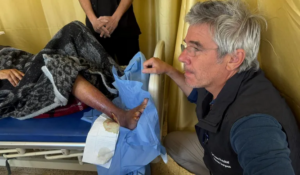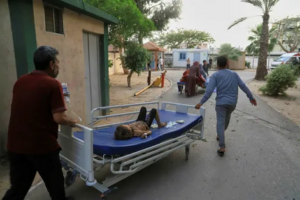Disaster zone volunteer surgeon says ‘nothing compares to what is happening in Gaza’

Dr. Tomo Potokar giving medical treatment in the Gaza Strip
Nir Hasson reports in Haaretz on 20 May 2025:
Dr. Tomo Potokar, a British surgeon volunteering in Gaza, spent the past week working in two hospitals in the southern Strip. One was struck by Israel and abandoned, while the other sustained shrapnel damage from a nearby IDF strike. On Sunday, the IDF ordered the evacuation of the area surrounding the hospital, home to hundreds of thousands of people.
Talking to Haartez, Potokar described the dire conditions faced by his patients, who are suffering from a brutal combination of severe wounds and hunger.
Potokar has spent many years volunteering in disaster zones, including three missions to Ukraine during the war, as well as work in Syria, Yemen, Afghanistan, Somalia, Mali, Nigeria, South Sudan and multiple stints in Gaza – the most recent at the start of the war.
When asked where Gaza in 2025 ranks on the scale of human suffering, he does not hesitate. “I think that what’s happening in Sudan is equally as grim and horrific as what is going on there. But having said that, nothing compares to what is happening in Gaza. I’ve been to Ukraine three times, but it’s absolutely nothing like what’s going on here in terms of the civilian population. In Ukraine, you hear about strikes on civilian infrastructure on occasion, that’s true, but the majority is armed forces fighting armed forces. Here, it’s a different scenario.”
According to Potokar, Gaza looks like the aftermath of an earthquake or “like Stalingrad after the Second World War.”
Last Tuesday, Potokar was working at the European Hospital near Khan Yunis in southern Gaza. At around 5:30 P.M., he finished an operation and returned to his lodging. “I was exhausted,” he said. “I lay down on the bed, and at roughly 6:20 P.M., there was a series of massive explosions. It was one after the other, which is unusual. You normally hear a drone or a plane and then one or two explosions, but this was intense. I thought this might be it [for me] because it sounded like they were getting very close. I then ran downstairs to the entrance.”
“There were two huge craters and wounded people lying on the ground. I went through the hospital to get to my colleague in the intensive care unit, and there was quite a lot of damage inside. People were obviously in complete panic, and nobody knew what was happening.”
The airstrike near the hospital targeted senior Hamas leader Mohammed Sinwar. At least six rockets landed within the hospital compound, prompting most patients, at least those able to stand, to evacuate with their families. According to Potokar, the next day, some patients and the medical staff started to return to the hospital, but then three further airstrikes hit just outside the ward they were in.
After the additional strike, the hospital decided to cease operations. Potokar was among the last doctors to stay with the remaining ICU patients awaiting transfer to other hospitals in the Strip.

Patients bbeing evacuated from the European hospital in Khan Yunis, Gaza, after it was hit by an Israeli army airstrike, May 2025
Among those evacuated was a two-year-old boy with a severe leg injury who was scheduled for another surgery on Saturday. However, after the evacuation, contact with his family was lost, leaving it unclear whether he underwent the procedure. After spending a day at Nasser Hospital in Khan Yunis, Potokar was transferred to Al-Amal Hospital, a relatively small facility run by the Red Cross, also located in the city. According to him, the overnight into Monday was relatively quiet, but around 6:00 a.m., the attacks resumed, once again hitting near the hospital.
“I think the closest was about 400 meters away, but a large piece of shrapnel landed in the emergency room. Fortunately, no one was wounded,” he said. According to Palestinian sources, the attack was intended to cover for an IDF special forces operation attempting to capture a senior Islamic Jihad leader.
“When the strike hits and you hear the noise of the bomb, all you hear is just screaming and wailing,” he said. “Anyone who has a heart only sees human suffering.”
“Can you imagine how it must feel to see two of your children just smashed up, not knowing if they’re going to survive, lying there semi-conscious with huge open wounds, bones sticking out? It’s a great emotional and psychological stress for everyone.”
“This morning, we operated on a woman with extensive wounds. She came in two days ago. She’s not yet aware that her whole family was killed in the same attack,” he said.
Potokar says that although he works primarily as a surgeon and doesn’t see patients admitted solely for malnutrition or severe hunger, he can clearly feel how the lack of proper nutrition is severely impacting their recovery.
“People’s immune system becomes depleted. They get anemic as well – simply not producing new blood,” he said. “It’s a combination of malnutrition that impedes your immune system, so you’re more prone to infection. The body starts to digest protein instead of fat for energy. Any additional stress, like a wound, makes it even more difficult to heal.”
“The women, children, disabled, elderly, simply everyone – what’s happening to them is absolutely horrific. I meet so many people who have lost either their whole family or members of their family,” he said.
“You know, two days ago our driver phoned his son-in-law, who was in Gaza City, begging him not to go out because it’s too dangerous. His son-in-law said he had to go out looking for food. And then he went out and was killed.”
“Almost every day, you find out that one of your surgical colleagues, a nurse or a pediatrician here has had a relative brought in after being hit.”
Minutes after speaking with Haaretz, Potokar received a message from the United Nations Office for the Coordination of Humanitarian Affairs announcing an evacuation order for the entire area surrounding the hospital.
Shortly beforehand, the IDF’s Arabic-language spokesperson had issued the same message, which covers most of Khan Yunis as well as the nearby villages of Bani Suheila and Abasan al-Kabira. It is unclear how many Palestinians live in the area now, but it is one of the largest evacuation orders issued since the start of the war, and its wording was deeply alarming.
“The hospital we’re in is just on the other side of the [evacuation] line, and the families of many of the staff live there,” Potokar said in a video posted on X.
“One of my colleagues, an orthopedic surgeon, has just gotten out trying to evacuate his family because they live in one of these areas. Now we’re just waiting for this onslaught that we’ve been informed of by the Israeli forces.”
This article is reproduced in its entirety
